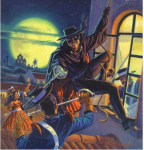R. Lawson Gamble's Blog: R Lawson Gamble Books, page 18
November 12, 2014
The Value of Writers Conferences
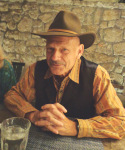 Having just returned from my second writers conference in six months, I find it natural to contemplate the value received versus the fiscal drain.
Having just returned from my second writers conference in six months, I find it natural to contemplate the value received versus the fiscal drain.
Most conference attendees , at least those to whom I speak after their conference is done, tend to evaluate the experience in terms of useful gain. That is to say, what did they take away from the experience that will serve them in the future? Generally this is not about the feeling of euphoria or the surge of inspiration or any other emotional stimulant the conference imbued, because those are impermanent and tend to weather away in the workaday world. It is about those specific skills, or tricks, or attitudes or perspectives which will help the writer over the long term.
In my writers group, a member report on a conference might be the complaint “I didn’t learn anything I didn’t already know”, or “there was one good session, but all the others sucked” or “it was good, but it was geared toward marketing, not writing skills” or vice versa. Ever once in a while, however, you’ll here an ecstatic attendee remark that it was wonderful and that every session had something valuable for them.
The proof is in the pudding, however. At five hundred dollars a pop, will they actually sign up again next year?
What is it a writer might expect to gain from attending a conference beyond the camaraderie, the support from other flailing novelists, or the ashes to riches stories of those who succeeded? Is there ever an element that can actually make a difference in a writer’s career?
Perhaps so. At both conferences I attended, the Western Writers of America Conference in Sacramento and the Tony Hillerman WordHarvest Conference in Santa Fe, I heard returning attendees claim that but for the conference in question, they would not be where they are now. And where was that? Sometimes that place was unclear, but admittedly others could demonstrate publishing success and a loud chink of change.
I have never yet attended a session that revealed the lightbulb secret to success, unless the bulb simply didn’t light for me personally. But I doubt that. Therefore, I must assume that the writer attributing his/her success to the conference must have found a private lightbulb, perhaps by meeting an agent or publisher to take them on, or maybe an experienced writer who took them under a wing. If that is how it works, there must be a less expensive and more efficient way to foster such meetings.
But in truth, I found both conferences valuable, if at a lesser level. I learned much that I did not already know, I gained new perspectives and made connections with nice people and found new ways to view my writing. All of this was constructive and renewing.
Perhaps one day an opportunity will arise that will propel me on a path to success. Until then, I will delight in honing my writing skills and learning my marketing flaws. And to be honest, I do enjoy the stimulation and inspiration from other writers, even if it does fade over time. After all, isn’t that precisely what we try to achieve with our own writing?
Tagged: Crime fiction, Fiction, inspiration, marketing, thrillers, writer conferences, Writing, writing classes, writing skills


November 4, 2014
The New Editing Conundrum

Like most writers, I am excited about the advances in digital publishing. In past columns I have detailed the many advantages we currently experience and those we anticipate in the future.
There are, however, some less delightful aspects of the new Indie Publishing revolution, as I have discovered recently.
This article is not about those natural and expected new obstacles, not about increased competition in the market place, nor about virtual shelves overcrowded with works aimed at quantity rather than quality in order to aggregate dollars. It’s not about potential piracy, or even about self marketing (a huge topic in itself).
This piece is about ever increasing responsibility. Specifically, the responsibility of the author to present his/her very best work, period.
Once upon a time, an author could write a book, look it over once or twice, hand it to an editor, and walk away. If any additional editing was needed, the editor or the publisher saw to it. Then it is published and it was done. Done!
That is not the case today. With technological advances it is now possible for the self publisher to return to his book to correct a misspelling, remove a duplicate word, or correct an indent at any time. In fact, the author could in theory change plot lines, remove chapters––in short, make any number of substantial changes to the book. Not just for a limited period of time; it can be done 24 hours a day – forever.
This would seem a tremendous advantage for the author, and in many ways it is. But it can also be a curse.
Editing a novel can be an endless process if one allows it. Each revisit, each change, has a domino effect which ensures that more changes will likely be necessary to reach perfection. The more the author reviews, the more changes suggest themselves. This is the definition of infinity.
Today this Miasma is exacerbated by accessibility. Not so long ago, if a guest at a cocktail party remarked on some perceived inaccuracy in a novel, the author could grin and shrug and move on. No longer. There is now a conscience nag that leads to additional research, and if indeed the guest turns out to be correct, the nag grows into guilt which in turn compels action. The author returns to the book to correct it, not just because he feels he should, but because he can, and he knows that everyone knows he can.
The moral to this tale is not just the standard reminder to edit, edit, edit before publishing a work, but also to learn where to draw that line in the sand. It is about finding the balance between one’s satisfaction with a published work and infinite editing. Know when to stop.
Tagged: digital publishing, editing, Indie publishing, novels, self-publishing, Writing


October 3, 2014
Boots On The Ground: Selling Real Books to Real People
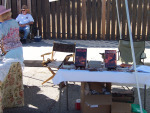 Last weekend I spent 10 hours a day for two days selling my books from a booth at the Los Alamos Old Days Celebration. I shared a booth with my wife, who sold handcrafted jewelry. We were outdoors under a canopy. Day 1 was very windy, which meant constant retrieval and resetting displays. Day 2 was hot and sweaty. It took us an additional day to recover. I sold nine books. Was it worth it?
Last weekend I spent 10 hours a day for two days selling my books from a booth at the Los Alamos Old Days Celebration. I shared a booth with my wife, who sold handcrafted jewelry. We were outdoors under a canopy. Day 1 was very windy, which meant constant retrieval and resetting displays. Day 2 was hot and sweaty. It took us an additional day to recover. I sold nine books. Was it worth it?
Nothing is certain with book sales today. On-line sales demand faith. You set your book parameters with the retailer (genre, category, tabs, synopsis, etc.) and then wait. If sales are slim, you might return and reset the parameters. And wait.
There is a certain amount of gratification that comes from face to face retail. The personal connection with the buyer is valuable. A positive conversation can build confidence. The sales presentation can be altered on the spot to suit the customer. The author gains immediate feedback (good or ill), and so does the buyer. The books can be signed, personalized for the buyer.
In the physical world of book retail, appearance is everything. While cover art is important for online retail, it is even more important for physical sales. It is the cover that draws the customer to the shelf or to the booth. It is the back cover material that helps sell it.
With personal sales the author’s appearance is important too. I try to wear an outfit similar to what I wore for the picture on the book. I watched people who pass by our booth glance at my book picture and then up at me. Curiosity is an excellent sales tool. Consistency in the appearance of both the book and author is important too.
There is something special about holding a book in your hands, flipping through it, feeling its weight, smelling the fresh pages. Once a customer does this, a sale is likely. My offer to sign it often seals the deal.
The greatest advantage of online sales is volume. Amazon, or Apple, or Barnes & Noble reach so many people. But profit from an eBook is small. And if you’ve contracted with an agent and a publishing house, even smaller.
Still, physical sales opportunities are few and far between for the average author. Physical sales outlets need to be nurtured over a period of time. Brick and mortar stores, signing venues, book fairs, and street fairs need to be approached, evaluated, convinced, or otherwise prepared in advance. But once established, most will then be available year to year.
I’ve found I can learn more from selling my books with my “boots on the ground”. A discussion with a potential buyer can have great value and offer insights into all facets of book production. And it is enjoyable. When I have spent months creating characters and determining their actions and lives, there is nothing more enjoyable than discussing them with people.
The personal connection helps the buyer as well. There is no better way to learn what lies between the covers of a book than to discuss it with the author.
Tagged: book cover, book fair, book marketing, book retail, Book vending, customer relations sales, ebooks, importance of cover, physical sales, reader connection, retail book


September 20, 2014
What Works in Book Marketing: Part Deux
There’s been a lot of scuttlebutt on the digital wires (so to speak) about what works, and what doesn’t work in book marketing. By and large, the substance of what I have read suggests that much of the social media we were once encouraged to use is no longer seen as useful.
There are exceptions. Here are four:
1. Blogs d o help to sell books, poll-takers say, but only when using certain guidelines. In particular, target a specific niche topic and offer free expertise and useful links.
o help to sell books, poll-takers say, but only when using certain guidelines. In particular, target a specific niche topic and offer free expertise and useful links.
2. Blog talk shows can increase visibility. A talk show host’s audience can be substantial. Choose a host who has been at it a while.
3. An attractive, well constructed, easy to navigate website, as always, it the foundation for social media marketing. There is a lot of good advice available surrounding the organization of your site.
4. Certain reader sites, such as Goodreads, can be powerful aids. But you need to stay active.
But what about Twitter? If you have spent countless hours trying to build your following to three or four figures, you have been wasting your time, the pundits are now saying. I get it. If you have hundreds of followers, you can not possibly read them all, you must narrow the field. The tendency is to read only the tweets from those we know, or on topics that interest us.
That takes us full circle, but along the way we have grown to feel responsible and so we tweet regularly anyway.
There are many social media sites that have come and gone. I have established a presence on some only to let them slip away. That’s probably not a good thing. And it’s embarrassing. But who can do it all?
What tactics do experts tout now for success in book marketing? Here are four:
1. Email lists, first and foremost. Lists garnered from your website, from your own social circles, former classmates, workmates, in short – people with whom you already have a connection, people who will see your name and open the message. Aim request Emails at gatekeepers who could be important to your sales asking for assistance and showing them how they can help. Get up close and personal.
2. Write lots of books. The more books you have out there, the more attention you draw to your other books. This tactic meets with universal agreement––more books translates into more money.
3. Get lots of reviews. And stay within your genre. If you write Romance, aim your marketing at sites about Romance. Blog about Romance. Become the guru of Romance.
4. Use your website to push your books, go easy on the other social media. Link everything back to your website and do your hard sell there. Keep it up to date, easy to find, easy to use, and easy to buy.
What will work next week? Who knows? More authors enter the market, literary agents change their modus operandi, publishers increase their royalties – in short, the industry is in flux, to say the least. Yet as things have changed, the four practices above have consistently weathered the storm.
Tagged: blog talk shows, blogs for marketing, book marketing, Book reviews, book sales, ePub authors, Goodreads, literary agents, marketing strategies, publishers, royalties, Social media, Twitter


September 8, 2014
The Holy Grail of Book Marketing
We have wri tten of this many times in the past, yet it bears more discussion. The knowledge and skills required by an author to market a book have nearly (and in some cases actually have) superseded the skills necessary to write a book. Gone are the days of devoting one’s time exclusively to writing.
tten of this many times in the past, yet it bears more discussion. The knowledge and skills required by an author to market a book have nearly (and in some cases actually have) superseded the skills necessary to write a book. Gone are the days of devoting one’s time exclusively to writing.
The learning curve for marketing is steep. Authors who undertake to market their own books require the audacity that allows them to believe they can accomplish in a few months what others have spent years of schooling and experience to master. Viewed through this lens, a self-published self-marketed writer today undertakes two simultaneous careers.
This came starkly to mind for me at a recent meeting of my writers club, when members discussed their reasons for attending an upcoming writers conference. The single compelling reason to spend the money and time, by consensus, was to learn more about marketing. Not writing.
I discern among writers the hope that at some forum, somewhere, a presenter will reveal the Holy Grail of book marketing, a simple technique or process that will maximize exposure and sales yet minimize time and effort. Somewhere in the back of my mind I nurture this hope. Call me Sir Wishalot.
Some authors have in desperation turned to publicists. This is a hard choice, because publicists cost money. At 3 or 4 dollars per eBook, the cost of a publicist could represent years of eBook sales. The author must overcome a deficit before the sales campaign has even begun. One would need to be confident that the publicist has already found the Holy Grail of marketing.
I do not believe that traditional publishing will ever completely disappear, but I do believe it will become an exclusive club. For most, publisher based marketing will not be part of the contract they sign. The publishing company logo may be a door to more sales, but it is also an avenue to a smaller percentage of the royalties.
The good news is that in this rapidly changing world of publishing, the number of writers seeking answers to the marketing question is increasing. Authors must compete for retail shelf space and exposure, but ultimately the greater benefits will come from pooling resources. A group or consortium of writers offers greater influence and power to negotiate with book retailers, advertisers, cover artists, editors, news media and so on. Such groups may well be the way of the future for authors.
Tagged: book marketing, book retailers, book sales, marketing tools, publicists, self-marketing, self-publishing, time to write, writers' consortium


August 24, 2014
Salomon Pico Addendum
It is past time to make good my promise to the history buff followers of this column to share findings from my research.
Of my ongoing projects, the latest development of interest concerns my research into the life of California bandit Salomon Pico, considered by some the Zorro model.
The Pico family (or should I say families) of California are vast and widespread. Some Picos arrived in California decades after Salomon’s antecedents came and may or may not be related. My work has centered upon the descendants of two sons of Santiago de la Cruz Pico, who came to Alta California with the Anza Expedition. The two sons are Jose Dolores and Jose Miguel.
Jose Miguel Pico sired Jose de Jesus Pico who lived in Santa Barbara County and built the adobe that President Ronald Reagan would own over a century later. He also sired Buenaventura Pico, parent of Lucretia de Jesus Pico who married Juan Calderon and from whom my friend Chuck Calderon of Santa Ynez descends.
Jose Dolores Pico sired Salomon Pico, the bandit. He also sired Salomon’s older sister Maria Filomena Carmen Rodecinda Pico six years earlier. She married a French Trapper, Louis y Arseneau Pombert. They began a line that arrived at Frances Tompkins, of San Juan Bautista. Salomon is her third great, great-uncle.
Frances graciously agreed to meet me in Los Alamos recently. We sat on a bench in front of the old Union Hotel on a beautiful afternoon and exchanged stories.
Frances undertook the project of transcribing the contents of a large red loose-leaf notebook, a Xeroxed copy of an original written by Ralph and Mrs. Milliken. She found it the San Juan Bautista City Library.
Ralph Milliken was the first curator of the museum that now bears his name in Los Banos, California. It opened as the Henry Miller Museum in 1958, and displays local history. Items that belonged to Miller, the town’s founder, can be seen alongside Yokut Indian artifacts, work and recreational items donated by families who’ve lived in the area for generations and a plethora of pictures and written interviews of people and places in Los Banos dating back to the 1800s.
The Milliken archives that Frances transcribed are recorded interviews with various early residents of the Los Banos/San Juan Bautista area. Frances was kind enough to share the work with me.
Of particular interest is a recorded recollection detailing the circumstances of Salomon Pico’s death. It is unfortunate that the preceding pages are missing. The recollections are possibly from a man named Luis Raggio who ran a saloon in San Juan Bautista and later a butcher shop there. Or they may have originated with Jesus Duran, who arrived from Mexico prior to 1850 (Note: Salomon Pico died in 1860).
Space does not allow me to share in detail this recollection, so I will summarize.
In this account, Pico arrived in Mexico and “got up a crew” and began killing and robbing there. On the 16th of September, Mexico’s Independence Day, there was a big celebration in Sausal de Comancho. Pico (apparently a great guitar player and dancer) played the guitar. Pico was asked to dance the Jarabe. While he was engaged in the dance, soldiers surrounded the ramada and captured him and his six partners. They took them out and shot them all. That effectively ended the celebration.
This may or may not differ from the accounts my research has revealed, which suggest Pico joined the Mexican military under the command of his old friend General Jose Castro, who thus protected him. According to those sources, Castro was murdered over a card game. Pico thus lost his protection and was executed.
I hope to learn more about this account and the author. Stay tuned.
Tagged: California history, Jesus Duran, Jose Castro, Los Banos, Luis Raggio, Ralph Milliken, research, Salomon Pico, San Juan Bautista, Sausal de Comanche, Zorro


August 20, 2014
Do You Really Need An Editor
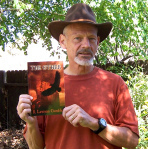 Editors are engaged in a task which never ends. No work is ever complete, no manuscript ever reaches perfection. I know this, because when I review my own work, there is always something I need to change.
Editors are engaged in a task which never ends. No work is ever complete, no manuscript ever reaches perfection. I know this, because when I review my own work, there is always something I need to change.
Certainly every writer should seek different perspectives on his/her work. Everyone is subject to their own brain orientation, which determines whether one see the trees or the forests. I see forests, and I badly need help from those who see trees.
Most writers have a close associate, a spouse or partner who is willing to do an initial read-through of a newly completed work. This is usually a person who knows the writer intimately, knows his/her foibles and habits, and is able to withstand the hostile vibrations that can emanate from an author while being critiqued.
Next is the outer circle of close friends, siblings, or associates who are willing to read the work and edit according to their strengths: line editing by the detail oriented, comments on plot coherence by the analytic, questions about characters from the socio-emotional.
A fortunate author will have found a writers group that meets regularly and whose members will take on the task of critiquing one another’s work. In the ideal situation these colleagues will pass along written comments for the author to take away.
An author with all these proofs in place is positioned to end up with a fairly well-edited manuscript, depending upon the thoroughness and expertise at each level.
So do you really need to pay a professional editor?
Let’s look at some positives.
Assuming you have found an editor and not a predator (anyone can hang out a shingle, so check carefully), there are a number of potential benefits. There is the confidence you feel with a professional stamp of approval (if you make the recommended revisions). There is the benefit you gain from the experience of someone who is current with the market and can guide you accordingly. Sometimes a professional editor might even have connections in the publishing world and be willing to connect you. There is the fact that the professional editor has a reputation to maintain, meaning you can usually expect them to do a pretty darn good job.
Now let’s look at some downsides.
The obvious negative here is cost. Beyond that, it is critical to find an editor who can keep your voice while editing your work. Sometimes it is advantageous to hire an editor who is not a writer. The tendency to overwrite one’s own style onto another authors work is strong in editors.
To digress for a moment, consider that reader (and writer) style preferences have changed dramatically over the years. Long sentences connected by ‘ands’ and commas would never survive most editors today. Yet often the appeal of a work is as much the lyrical flow of the narrative as it is the content. T.C. Boyle loves ands which he uses to great effect to connect the thoughts of his characters into a stream of consciousness, one spark igniting the next until an electric current forms and lights the bulb, and isn’t this the way we want to learn about our character? Or consider Hemingway, who often paints his backdrop using hundred-word-long sentences hung together with commas, which constitute a myriad of impressions gathered almost simultaneously, which, after all, is the way we view scenes in real life.
I have often wondered how some editors I’ve known would react to the work of a Boyle or Hemingway today?
Editing has other perils. Too often well intended erasers can trim a lyric work down to ugly biting stubby sentences.
And even the best editors will miss something. I have read very few books where there weren’t typos, misspellings, or the wrong usage of a word.
As always, the ultimate responsibility rests with the author. The key is to recognize your voice and then do your best to preserve it.
Tagged: Author, author's voice, edit, editing, editor reputation, Ernest Hemingway, manuscript preparation, professional editor, reader groups, T.C. Boyle, writers, Writing


August 10, 2014
Should You Read a Book To Review It?
Reviewing 101,  right?
right?
First you read the book, then you review it.
THE OTHER was a recent recipient of a ‘2′ rating and a very critical review from someone who admitted he/she stopped reading after just a few pages.
Fair enough. Stop reading if the book is not your cup of tea. But don’t review it. You haven’t read it.
I’m normally fairly thick skinned about reviews, all authors need to be. There’s all kinds of folks out there and all kinds of opinions. But an author has no way to undo the damage done by a very critical review by a non-reader.
Of its 36 reviews on Amazon, THE OTHER has received two other ‘2′ ratings. I suspect both readers expected it to be something it wasn’t. Fair enough. They didn’t like it. But at least they read it.
Why is it so important to read a book to review it? Because it may be that something you learn later on in the book might explain or enhance those opening pages. It may be that the book will hook you later on. In this particular case, all of the complaints expressed by the reviewer are completely explained later in the book.
Stop reading the book if it doesn’t grab you. It is the author’s job to try to hold you, but if he doesn’t, so be it. That’s gonna happen. But don’t review it. You didn’t read it.
Tagged: Amazon, book raters, book readers, book reviewers, critics, critique, power of reviewers


August 6, 2014
It Ain’t Necessarily So
In the absence of knowledge, we assume. Such assumptions can be erroneous and lead to fallacious thinking which can create problems for us. This is particularly so in publishing a book.
Once t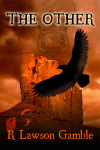 he author has completed a work and committed it to the public, nothing remains but to await the court of public opinion. Yet often that verdict is unclear, which leads to guesses or assumptions on the part of the author. Trouble comes when decisions are made based upon these guesses or assumptions.
he author has completed a work and committed it to the public, nothing remains but to await the court of public opinion. Yet often that verdict is unclear, which leads to guesses or assumptions on the part of the author. Trouble comes when decisions are made based upon these guesses or assumptions.
The second novel in my Zack Tolliver FBI series is fully one and a half times longer than the first. It is different in a number of other ways. It takes place in a large city, not the southwest deserts. The plot is more complex. There are more characters and subplots. In general, I would characterize it as more challenging and difficult to follow than the first.
The first novel, on the other hand, received many strong reviews right from the start. People reported finishing it quickly, with one person claiming to read it cover to cover in one sitting, with just two hours out for sleep.
Not so the second novel. To date, it has but five reviews with Amazon. There has been little feedback beyond those five reviews. In the absence of facts, I have made assumptions.
The problems that can arise from this came home to me while engaged in a casual discussion with my neighbor. He has read both of the books. From earlier discussions I knew he enjoyed the first book in the series. I saw my opportunity to learn how he felt about the second, compared to the first.
When I asked the question, he hesitated. He seemed reluctant to respond. Finally he said, “No offense, but…” Here it comes, I thought. He went on. “No offense, but I found the second book to be more entertaining.”
I’m sorry…what?
He went on to explain that while he enjoyed the tempo and mystery and ambiance of the first story, he found the characters, their interplay, and the clue gathering intrigue and suspense of the second more entertaining.
I was surprised, gratified, puzzled. I had assumed that the greater length and complexity of the second work put people off, and they were putting it aside before finishing it, finding it too much effort for the reward. I had steeled myself to accept it did not measure up to the first. But apparently I was wrong.
Meanwhile, I have begun my third novel in the series. Taking what I assumed was a lesson from my second work, I moved away from the complexity of plot, the multiple subplots, and, in fact, the bustling city and all its distractions. My protagonist and I moved back to the simplicity of country life.
I based that decision on an assumption made in the absence of knowledge. Had I been a glass half full sort of person, I might actually have taken Zack into an even bigger city in a novel jam packed with new characters and intrigue. But I’m not, and I didn’t.
Is there a lesson to be gleaned in all of this? The importance of patience, I suppose. Or maybe there’s really no lesson at all. Maybe I would have made the change regardless. It could be – it just could be – that I made that decision because it’s what I wanted to do in the first place. Just say-in’.
Tagged: Amazon, fiction writing, Publishing, reader expectations, self-publishing, the readers mind, what readers think, writer decisions


July 23, 2014
Why Their Success Story is not Your Success Story
Recent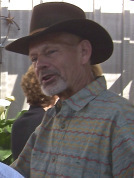 ly, while reading an encouraging piece about someone’s ten steps to successful book marketing, it dawned on me that there might possibly be more authors of how-to-succeed books than people who are actually successful authors. Let’s face it, how-to-succeed books are a tremendous market. We are drawn to them like bears to honey.
ly, while reading an encouraging piece about someone’s ten steps to successful book marketing, it dawned on me that there might possibly be more authors of how-to-succeed books than people who are actually successful authors. Let’s face it, how-to-succeed books are a tremendous market. We are drawn to them like bears to honey.
In a world where anyone can publish a book and place it on a retail shelf, the crux of success has shifted to marketing. What sure-fire steps can I take to position my work where it will be noticed by the most readers? There is no lack of pamphlets and essays and books out there to answer this question (two dollars, please). Can there really be so many sure-fire steps to successful marketing? I don’t think so.
Yet I continue to be drawn to these testimonials. There is a treasure hunt element to them. One day I might find THE ANSWER. One day, if I read enough step-by-step lists, I will find it; the perfect effort-free, instant, sure-fire step to entice the world’s population to read my book. After that, success will surely follow, for I know that anyone who actually reads my book will certainly love it.
Wishful thinking aside, it is important to understand when reading such lists that their success is probably not going to be your success. As human beings, we are uniquely different. My strength, your strength, is that difference. It is what sets us apart, and we need to set ourselves apart to be noticed.
Most successful authors and book marketers have become so by being innovative. They swim against the current, they turn left when the other lemmings turn right, they break the rules. This is not done arbitrarily. Their methods come as the result of introspection. Take a hard look at yourself and answer the question: what is it about me that is different from anyone else I know? Once you have answered that question, think about how you can use that trait to gain an advantage.
One such trait is hutzpah. Clive Cussler tells the story of his early writing days and his frustration (which we all share at one time or another) with finding someone to publish his books. No agent would take him on. Then he thought of a device; he wrote a letter to a publisher introducing himself as an agent. In the letter he explained that they had met at a party, and he (the publisher) had asked for his best author prospects. Clive knew that the publisher attended a great many parties and after getting a buzz on, probably would not recall every agent he met. Taking advantage of this, the faux agent (Cussler) recommended a manuscript from his best author (Cussler). And the rest is history.
Your unique trait might not be hutzpah, but you certainly have one, and it can likely be engineered in a way to elevate you above the crowd. It requires thought, and imagination.
These are unique times for authors. The publishing world is going the way of the music world, a previously tightly controlled market that imploded. It is a seismic shift that will rumble and quake for quite a while. But one thing is clear: authors are gaining much more control of their own destinies than they have ever had before. And until the rumbling stops and the fallout settles, there is no single strategy that will guarantee success for an author. The road to success for one author could well contain more potholes than pavement for another.
Tagged: authors, Cussler, finding readers, how-to-succeed, marketing, Publishing, road to success, rules for success, Writing


R Lawson Gamble Books
- R. Lawson Gamble's profile
- 27 followers


